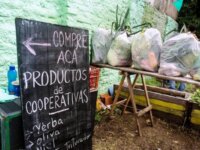The solution generates a controlled virtual environment quite similar to real evacuation and emergency situations. It seeks to train "Brigadistas" (first response agents) in change of guiding the evacuation of the people from each building while ensuring the bindingness to the protocol and safety measures in case of emergency. The innovation was trialed in an evacuation mock-up in the Presidency building.
Innovation Tag Opengov: enablers
Bogotá Local was developed to address some of effects of the economic crisis caused by the pandemic to low-income and vulnerable families in Bogota. This is a reactive response in the short term oriented to recovery and that, in the medium and long run, will consolidate as part of the so-called "people's economy" (economía popular). It is an innovation deployed by the Secretariat of the Government and the Bogota Mayor's office to, principally, serve women, young populations and the elderly.
GovTech Poland has developed world's first challenge based procurement model where the authors of the best idea receive a full implementation contract without the need for an additional cumbersome tender. With the goal of opening procurement to all creative individuals, the model covers the process from identification to implementation. A pilot run, tested in both central and local institutions has increased SME participation in procurement processes by an average of 1600% (in a sample of 250)…
Make.org est une plateforme européenne de mobilisation citoyenne autour d’actions de transformation de la société. Dans ce cadre, Make.org développe une solution digitale de consultation massive, totalement inédite, capable de faire participer autour d’une question simple d’intérêt général, plusieurs milliers de citoyens, dans plusieurs langues, et de restituer les résultats de cette consultation en ligne, de manière quasi instantanée. Cette solution est complétée des…
En 2015, le Parlement de Wallonie a engagé une réforme de son Règlement ayant notamment pour objectif d’associer davantage les citoyens wallons au travail législatif des députés.
Dans ce cadre, plusieurs dispositifs ont été mis en place dont la plateforme "Un décret par tous, un décret pour tous" qui vise à encourager les citoyens à intervenir directement dans la rédaction d’un décret sur base d’une problématique soulevée par un député.
Les Halles Civiques is a third-place network that gathers organisations working on citizen empowerment, public innovation, and democratic progress. Its members are researchers, designers, social innovators, entrepreneurs, etc. It aims to contribute to a richer and more inventive democratic life at the local, national and international level, and strengthen democratic innovation. It is also a physical space where citizens, professionals and representatives can work, meet and discuss.
The European Citizens’ Consultations (ECCs) were a project aiming to engage citizens in a consultation about what Europe meant to them. It was formed of two strands; an online survey about the future of Europe, and a series of national consultation events organised by national governments and other organisations like NGOs, think tanks, and academic institutions. This was a new experiment to give European citizens the possibility to express and exchange their opinions about the Union and its…
2018 was the year of reflection on the future of Europe. In order to understand the hopes and fears of citizens of Latvia regarding the future of European Union, more than 1500 citizens have been engaged in consultations that took place both in the regions of Latvia and online. Consultations were co-organized by state institutions and civil society organisations using various experimental formats.
Education in Open Government is a project whose main objective is to foster social and civic competences for the exercise of one's democratic citizenship in children and young people. It involves three phases:
1) Teachers' training via a massive online open course (MOOC).
2) Implementation of educational projects in schools: for this purpose, 3 guides of Education in Open Government have been published: Primary Education, Secondary Education and High School.
3) Evaluation of the experiences.
Case Study
Ensuring Impartiality through Identity-Neutrality Provisions: the Case of Freedom of Information in…
The Internet has facilitated online services for citizens, but it has also facilitated Internet searches of service-seeking citizens by public officials, triggering conscious or unconscious bias. Via freedom of information (FOI) requests, academics provided evidence of this phenomenon at work. Brazil's Comptroller General (CGU) responded by implementing a check-box in its online FOI requesting system so that requesters could choose to remain anonymous. This innovation is a first for FOI regimes.



